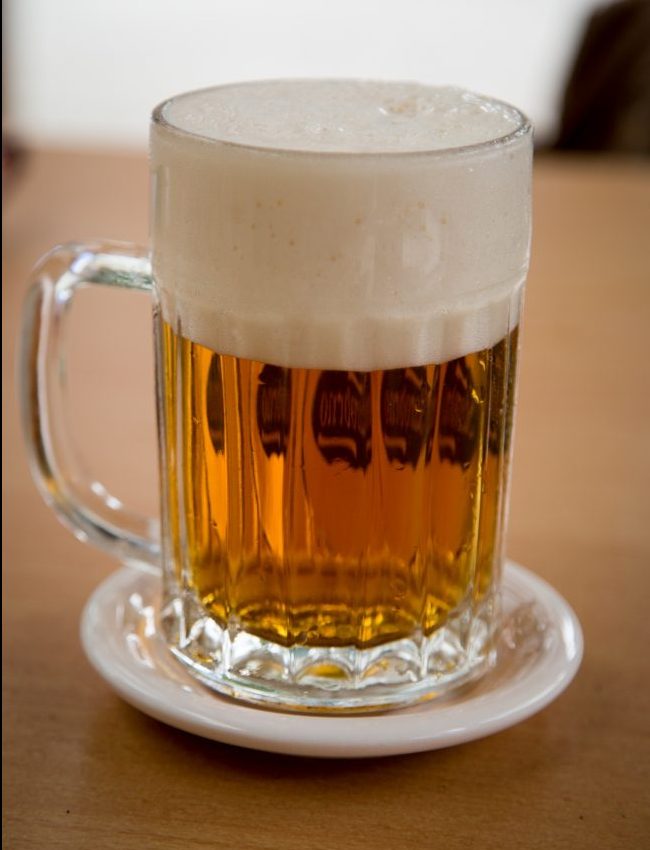Using the Irish words for ‘beer’ (beoir, beorach, beoracha) in sentences Posted by róislín on Mar 16, 2017 in Irish Language
(le Róislín)
Before we continue our series on seasonal beverages (and I do have my eye on some May Day punches), I thought it would be interesting to take a closer look at the word for beer itself. The word has three main forms, ‘beoir,’ ‘beorach,’ and ‘beoracha.’
Before launching into the forms themselves, just a brief note on pronunciation. Note that the “r” changes from the buzzy sound of the slender “r” (beoir) to the “flapped r” (very briefly trilled) of “beorach” and “beoracha.” The slender “r” sound isn’t typical in English at all, but we do see it in tons of Irish words, like “fir,” “tirim,” “breá,” and “Máire.” If it helps, the sound of the “r” in the popular Czech name Jiří (IPA [ˈjɪr̝iː]) is essentially the same. The broad (or “flapped”) “r” of “beorach,” on the other hand, is like the “r” in the Irish words “Nóra,” “boscaí móra,” and “arán.”
So here are our three main forms:
beoir, beer
beorach, of beer
beoracha, beers, and this one also means “of beers”
Of course, we can add lenition (séimhiú) and eclipsis (urú) according to the particular phrase or sentence that we’re using:
an bheoir, the beer
ar an mbeoir, on the beer, or in the northern dialect, ar an bheoir (maybe not a real typical phrase from an English-language perspective, but remember, in Irish, a taste, good or bad, will be “on the beer” — Tá blas maith ar an mbeoir sin.)
braichlis bheorach, beer wort. Why “bheorach” and not “beorach“? — because braichlis is grammatically feminine and “beer” is describing it further, so we’re using “beorach” as an adjective. So, same rule as the more basic “bean mhaith” or “scian phóca.”
ar bheoracha Meiriceánacha, on American beers. Remember, in Irish, we could use an expression like this to describe the taste, or in the case of some American beers, IMHO, the lack of taste (beoracha micreaghrúdaithe excepted, of course). Why? Because a “blas” (taste) is typically described as being “on” a food or drink in Irish.
i mbeoracha, in beers. Well, I can’t think of too many ways to apply this particular phrase, showing “urú,” but in theory it could exist, perhaps in a discussion of “leasaithigh” (preservatives) in beers (i mbeoracha).
na mbeoracha, of the beers
So, those are the parameters of what we have to deal with for our cleachtadh. Note that for these sentences, some forms may be repeated. Freagraí thíos.
1)) An maith leat _____ Ghearmánach?
2)) An maith leat _____ Gearmánacha?
3)) An fearr leat beoir a ól as gloine _____ nó as “stein” ornáideach nó go díreach as an mbuidéal?
4)) Cé acu is mó, buidéal _____ nó ceaig _____?
5)) Cé acu is mó, ceaig _____ nó oigiséad _____?
6)) Cé acu is mó, gnáthchanna _____ nó caraf fíona?
7)) Cén blas atá ar na _____ neamh-mheisciúla?
8)) An maith leat an _____ sin?
9)) An bhfuil blas torthaíoch ar an _____ sin?
10)) An maith leat _____ a bhfuil blas seacláide uirthi?
11)) Tá praghasanna na _____ iompórtáilte níos airde ná praghasanna na _____ áitiúla.
12)) An mbíonn leasaithigh i _____ orgánacha?
13)) Cén praghas a bheadh ar _____ Marsacha i mbeár ar an ngealach? (a very hypothetical question, of course)
14)) Tá gloiní _____ ar fáil sa siopa sin.
15)) Tá praghasanna ____ níos airde ná praghasanna ______. (Use the prefixes “scoth-” for “premium” and “gnáth-” for “ordinary”)
16)) Tá cúr deas tiubh ar ____ mo chara.
Ar mhaith leatsa abairt a scríobh faoin mbeoir is fearr leat? SGF — Róislín
Freagraí:
1)) An maith leat _beoir_ Ghearmánach?
2)) An maith leat _beoracha_ Gearmánacha?
3)) An fearr leat beoir a ól as gloine _bheorach_ nó as “stein” ornáideach nó go díreach as an mbuidéal?
4)) Cé acu is mó, buidéal _beorach_ nó ceaig _beorach_?
5)) Cé acu is mó, ceaig _beorach_ nó oigiséad _beorach_?
6)) Cé acu is mó, gnáthchanna _beorach_ nó caraf fíona?
7)) Cén blas atá ar na _beoracha_ neamh-mheisciúla?
8)) An maith leat an _bheoir_ sin?
9)) An bhfuil blas torthaíoch ar an _mbeoir_ sin?
10)) An maith leat _beoir_ a bhfuil blas seacláide uirthi?
11)) Tá praghasanna na _mbeoracha_ iompórtáilte níos airde ná praghasanna na _mbeoracha_ áitiúla.
12)) An mbíonn leasaithigh i _mbeoracha_ orgánacha?
13)) Cén praghas a bheadh ar _bheoracha_ Marsacha i mbeár ar an ngealach?
14)) Tá gloiní _beorach_ ar fáil sa siopa sin.
15)) Tá praghasanna _scothbheoracha_ níos airde ná praghasanna _gnáthbheoracha_.
16)) Tá cúr deas tiubh ar _bheoir_ mo chara.

Build vocabulary, practice pronunciation, and more with Transparent Language Online. Available anytime, anywhere, on any device.





Leave a comment: